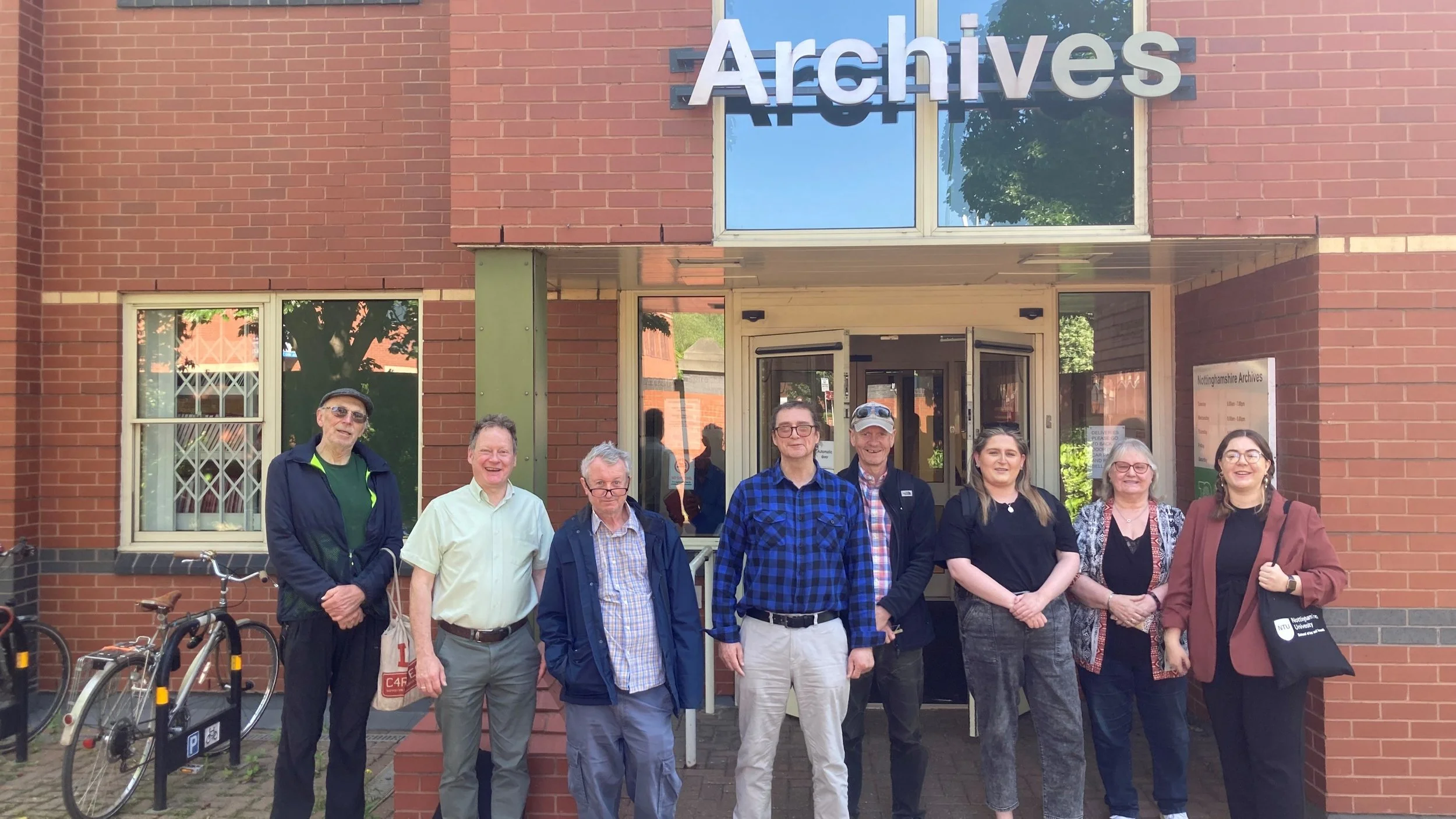Middle Street Resource Centre taught me…
Photo: Project team at Oral History Society conference. L-R Dr Dale Copley, Dr Verusca Calabria, Professor Geraldine Brady. Credit: Phil Formby
My eighteen-months supporting the National Heritage Fund Project, Fifty Years of the Middle Street Resource Centre comes to an end this week.
The project created, recorded and shared the heritage of the Middle Street Resource Centre, Beeston, Nottingham – a community centre caring for those with mental health challenges in the community for over 50 years.
The Project had some ambitious and wide-ranging outputs. All outputs were co-produced with people with lived experience of mental health.
I think as a project team, we can be proud that we delivered….
Image: Infographic of key project outputs
A primary aim of the project was to represent mental health in the archive, and to redress the archival tendency for mental health records to be authored by doctors and the medical establishment (as supposed to those with lived experience). The oral history testimony we recorded with members of the Middle Street community and the creative outputs created as part of the project which we have been archiving with East Midlands Oral History Archive and on the project website makes an effort to redress this balance.
The project also wanted to raise awareness of the challenges facing those living with long-term mental health conditions – particularly in the face of cuts to services. We undertook extensive evaluation of the project exhibitions, and the feedback suggests we did have an impact, raising awareness and encouraging reflection among a public audience.
“Fascinating insight. I learned a lot from the stories. Very valuable to see this because it helps me understand the importance of this type of care centre.” Exhibition visitor
“I would be lost without the Centre, lovely to see being celebrated.” Exhibition visitor
Personal highlights
Above all for me, the joy of this project has been the privileged access to the Middle Street community. Wonderful people work at the Centre, as staff members, trustees, volunteers, and members - people working on their own mental health and supporting others to do the same. The Centre’s peer-support model is applicable not just to mental health challenges, but to all challenges we face as humans. I have come away resolving to think about what a peer-support model might look like on any future project.
We can all only live one life, and so the best way to understand more about the world is to listen and understand the lives others have lived. Doing so at Middle Street – formally through oral history or informally through chats in the café - is to understand how easy it would be to end up in crisis, but also to understand that sometimes crisis can be prevented by early intervention. The safe space offered by Middle Street is such a powerful interventive tool for its members. And I don’t think it is just the wonderful people. It is also the physical space (the place), and the rhythm and stability of the Middle Street week. How can I apply that powerful triumvirate of people, place, routine to my work in heritage?
Photo: Project photography in the Middle Street Resource Centre garden. Credit: Phil Formby
Every community with which you work, gifts you an expansion of language, and through language we make sense of the world. Once I understood the difference between a social and medical model of mental health, much of my existing thinking about how I believe we should treat people (not just people with health challenges) fell into place. It turns out I’ve been trying to treat people with ‘unconditional positive regard’ all this time, and surely my efforts to do that are only going to be enhanced by having some language around it. Folks working in heritage are generally a well-intentioned bunch, but we’d make much more of an impact with our participation and engagement projects if we took time to learn from our colleagues in the therapeutic space.
That said, the amount of enjoyment I still take from doing the odd bit of project delivery on these Lottery projects (many, many projects later), confirms to me that I am a heritage person at heart. A standout moment on this project was a visit to the Nottinghamshire Archives to view their archival holdings relating to mental health. GDPR restrictions meant we were looking at records from over one-hundred years ago and of course we all reflected on the differences in attitudes to people with mental health conditions in the past, and the changing language used to describe mental health conditions… But, what was much more powerful for me was one of our party, a longstanding member of the Middle Street community, pouring over an old map labelled Mapperley Asylum and explaining to us how as a patient of that hospital he had been taken on a daily walk, tracing with his finger the route they took, and reflecting how it would have been the same as a patient 100 years before.
Photo: Project visit to Nottinghamshire Archives.
That is one of the things I love about heritage, that continuous line reaching back into the past, the way it grounds our experiences, tells us that others have gone before. There is a reassurance in that, which we respond to on a human level, even (or maybe especially) when the histories we are telling are complex.
Dale Copley was the Heritage Project Officer on the National Heritage Lottery Fund project, Fifty Years of Middle Street Resource Centre: The Hidden Heritage of Wellbeing from September 2022- March 2024. The project was led by Dr Verusca Calabria, Senior Lecturer in the Department of Social Sciences at Nottingham Trent University and was delivered in partnership with the Middle Street Resource Centre, Beeston.
Dale Copley is a freelance heritage project manager with the creative agency, lode heritage.




